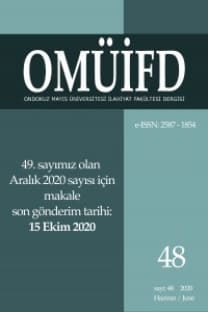Tanrı İsraf Eder mi?
Din Felsefesi, Tanrı, Evren, Yaşam, İsraf
Does God Waste?
Philosophy of Religion, God, Universe, Life, Waste,
___
- Aristoteles. Fizik. çev. Babür Saffet. Ankara: YKY Yayınları, 5. Basım, 2014.
- Cevizci, Ahmet. Felsefe Tarihi. İstanbul: Say Yayınları, 2012.
- Clark, Stuart. Towards the Edge of the Universe. New York: John Wiley&Sons, trsz.
- Collins, Robin vd. Allah, Felsefe ve Bilim. ed. Caner Taslaman - Enis Doko. İstanbul: İstanbul Yayınevi, 2013.
- Darwin, Charles. On the Origin of Species,. Oxford: Oxford University Press, 2008.
- Darwin, Charles. The Descent of Man, and Selection in Relation to Sex. Princeton, N.J: Princeton University Press, 1981.
- Davies, PauL. Son Üç Dakika: Evrenin Nihai Kaderi Hakkında Tahminler. çev. Sinem Gül. İstanbul: Varlık, 1999.
- Davies, Paul. Tanrı ve Yeni Fizik. İstanbul: Alfa Bilim, 2014.
- Dawkins, Richard. Climbing Mount Improbable. New York: Norton, 1st American ed., 1996.
- Dawkins, Richard. The Ancestor’s Tale. London: Weindenfeld&Nicolson, 2006.
- Dawkins, Richard. The Blind Watchmaker: Why the Evidence of Evolution Reveals a Universe Without Design. New York: Norton, 1996.
- Dawkins, Richard. The God Delusion. London: Bantam Press, 2006.
- Dawkins, Richard. The Selfish Gene. Oxford ; New York: Oxford University Press, 30th anniversary ed., 2006.
- Dawkins, Richard - McKean, Dave. The Magic of Reality: How We Know What’s Really True. New York: Free Press, 2011.
- Gasperini, Maurizio. The Universe Before the Big Bang: Cosmology and String Theory. Berlin: Springer, 2008.
- Hawking, Stephen. Kara Delikler ve Bebek Evrenler. İstanbul: Sarmal Yayınevi, 1993.
- Hawking, Stephen. Zamanın Daha Kısa Tarihi. çev. Selma Öğünç. İstanbul: Doğan Kitap, 2007.
- Hawking, Stephen. Zamanın Kısa Tarihi. çev. Barış Gönülşen. İstanbul: Alfa Bilim, 2017.
- Hume, David. Din Üstüne. çev. Mete Tunçay. İstanbul: İmge Yayınları, 1995.
- Kirkland, Kyle. Particles and the Universe. New York NY: Facts On File, Inc, 2007.
- Kiziroğlu, İlhami. Genel Biyoloji: Canlılar Bilimi. Ankara: Okutman Yayıncılık, 2010.
- Leslie, John. Universes. London ; New York: Routledge, 1989.
- Mayr, Ernst. This Is Biology: The Science of the Living World. Cambridge, Mass: Belknap Press of Harvard Univ. Press, 6. pr., 1998.
- Meadows, A. J. The Future of the Universe. London: Springer, 2007.
- Ochiai, Ei-ichiro. Chemicals for Life and Living. Heidelberg ; New York: Springer, 2011.
- Parlatır, İsmail - Türk Dil Kurumu (ed.). Türkçe Sözlük. Ankara: Atatürk Kültür, Dil ve Tarih Yüksek Kurumu, Türk Dil Kurumu, 9. baskı., 1998.
- Rich, R.M. The Metal-Rich Universe. ed. Garik Israelian - G. Meynet. Cambridge: Cambridge University Press, 2008.
- Russell, Bertrand. What I Believe. London: Routledge, 2004. http://public.ebookcentral.proquest.com/choice/publicfullrecord.aspx?p=182687
- Russell, Bertrand. Why I Am Not a Christian: And Other Essays on Religion and Related Subjects. New York: Cambridge University Press, 2005.
- Santos, N.C. The Metal-Rich Universe. ed. Garik Israelian - G. Meynet. Cambridge: Cambridge University Press, 2008.
- Schulze-Makuch, Dirk - Irwin, Louis N. Life in the Universe: Expectations and Constraints. Berlin ; New York: Springer, 2004.
- Stenger, Victor J. God: The Failed Hypothesis: How Science Shows That God Does Not Exist. Amherst, N.Y: Prometheus Books, 2007.
- Taslaman, Caner. Evrim Teorisi Felsefe ve Tanrı. İstanbul: İstanbul Yayınevi, 15. Basım, 2015.
- Ulmschneider, P. Intelligent Life in the Universe: From Common Origins to the Future of Humanity. New York: Springer-Verlag, 2003.
- Uslu, Ferit. Tanrı ve Fizik: Büyük Patlama ve Öncesi. Ankara: Nobel Yayın Dağıtım, 2. baskı., 2010.
- Wolf, Susan R. Meaning in Life and Why It Matters. Princeton, N.J: Princeton University Press, 2010.
- Yayın Aralığı: 2
- Başlangıç: 1986
- Yayıncı: ONDOKUZ MAYIS ÜNİVERSİTESİ
İsmail Konevî’nin Beyzâvî Tefsiri Haşiyesinde Ashab-ı Kehf Kıssası Analizi
Arap Dili Gramerinde Nûnü’l-vikâye’nin Kullanım Alanları ve Manaya Etkisi
Şâtıbî’ye Göre Kişiye veya Duruma Özel Verilmiş Hükümlerin (Kadâya’l-a‘yân) Hukukî Değeri
Bursevî'nin Nesih Konusunu Değerlendirmesi
Süleyman MOLLAİBRAHİMOĞLU, Sıla İSKEÇELİ
Kitâbetü’l-Hadîs’e İlişkin Müsteşriklerin Görüşleri
İlim Bölümleri Üzerinden Dârimî ve Buhârî’nin İlim Anlayışını Okumak
